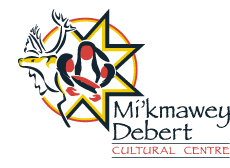Mi'kmawey Debert Cultural Centre Trivia
Congratulations - you have completed Mi'kmawey Debert Cultural Centre Trivia.
You scored %%SCORE%% out of %%TOTAL%%.
Your performance has been rated as %%RATING%%
Your answers are highlighted below.
Question 1 |
If a Mi’kmaw says “kesalul”, how do they feel about you?
They think you’re weird | |
You should run | |
They love you |
Question 1 Explanation:
“Kesalul” means “I love you”. You might say “kesalul aq nin” (and that means I love you too).
Question 2 |
Which plant did Mi’kmaq traditionally use to cure colds, tuberculosis and laryngitis?
Ground Juniper | |
White Spruce | |
Alder |
Question 2 Explanation:
While White Spruce has been used to treat colds, tuberculosis and laryngitis. Alder treats rheumatism, and stomach/kidney ailments. Ground Juniper treats kidney ailments and bladder infections. Juniper also can be used to lower blood-sugar levels.
Question 3 |
The Mi’kmaw game of waltes is a set of playing pieces, shaken in a bowl made of:
Wood | |
Stone | |
Antler |
Question 3 Explanation:
The bowl was hollowed out of a large burl, or knot, which grew on the trunks of large trees.
Question 4 |
In the early and mid 20th Century the Indian Affairs developed introduced the Centralization policy for the Mi’kmaq in Nova Scotia. The policy included efforts to:
Provide services from one central office | |
Move the Mi’kmaw population to two reserves | |
Deliver services to Indians from urban centers |
Question 4 Explanation:
The aim of Centralization was to relocate the Mi’kmaq to two reserves, Eskasoni and Shubenacadie. Promises were made of new houses and work that were not kept.
Question 5 |
It is safe to keep an “apli’kmuj” as a pet:
True | |
False |
Question 5 Explanation:
Many people keep rabbits as pets.
Question 6 |
If you’re speaking, and a Mi’kmaw is saying “e’e”, he or she is:
Clearing his throat | |
Wanting you to hurry up | |
Agreeing with you |
Question 6 Explanation:
e’e: “yes”. In a conversation, it means a Mi’kmaw is in agreement with you, or understands your point of view.
Question 7 |
The 1794 Jay Treaty allows Mi’kmaq to:
Impose road taxes and highway tolls | |
Cross the Canadian-United States border freely | |
Keep large game animals regardless of by-laws |
Question 7 Explanation:
The Jay Treaty allows the Mi’kmaq people to live and to work in the United States and Canada, and to cross the border freely with personal property.
Question 8 |
Ancient Mi’kmaw beliefs honour how many Creator figures?
Three | |
One | |
Seven |
Question 8 Explanation:
There is one Creator. Legends tell of many beings having various degrees of spiritual powers, but only one supreme Creator figure.
Question 9 |
In 1973, which community became the 12th Mi’kmaw band in Nova Scotia?
Pictou Landing | |
Acadia | |
Membertou |
Question 9 Explanation:
With more than 1,000 members, the Acadia First Nation is comprised of five reserves, which are located in various locations across southwest Nova Scotia.
Question 10 |
Mi’kmaq use sweetgrass, sage, tobacco and cedar for “smudging”. “Smudging” is:
Cleansing with smoke | |
A kid’s game | |
Painting |
Question 10 Explanation:
Mi’kmaq burn braids of sweetgrass, cedar, tobacco, sage and pass the smoke over their bodies and faces to cleanse the mind and spirit. This is a common practice among First Nations; the herb used to smoke varies according to the area. Mi’kmaq also use sweetgrass in basketry.
Once you are finished, click the button below. Any items you have not completed will be marked incorrect.
There are 10 questions to complete.
|
List |

 sharing our stories
sharing our stories